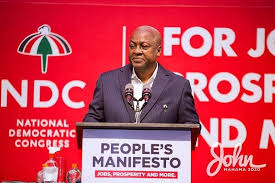Former President of Ghana and flagbearer of the National Democratic Congress (NDC), John Dramani Mahama, has promised to reset the Ghanaian economy through the removal of the E-Levy and the betting
tax, and rationalise fees charged at the ports.
Speaking at the launch of the NDC manifesto on Saturday 24th August 2024 in Winneba, John Mahama disclosed plans aimed at stabilizing the cedi against the dollar and creating more job opportunities.
“First is resetting the economy for prosperity. In the first 120 days in office, we will hold a national economic dialogue to draw up a four-year fiscal consolidation plan. We would rationalize taxes, abolishing among others the obnoxious e-levy, the COVID levy and the 10% levy on bets winning.”
“We will review import duties and levies on vehicles and equipment meant for industrial and agricultural purposes. Ladies and gentlemen, we will rationalize fees and charges at the ports and implement emergency measures to stabilize the cedi and the macroeconomic environment. Ladies and gentlemen, we’ll use the price stabilization and recovery levy to cushion consumers of petroleum products.”
He also stated that his government will probe into the Gold for Oil Policy of the NPP and restore the licenses of banks and financial institutions which were wrongfully closed down.
“We will investigate the NPP’s opaque gold for oil deal. We will review the gold purchase program of the Bank of Ghana and will restore the licenses of wrongfully collapsed banks and financial institutions. We will increase indigenous participation in the banking and financial sector, and we will free the statutory funds, the Get Fund, NHIL, and road fund, to be able to achieve their mandated objectives.”
Additionally, John Mahama elaborated on the 24-hour economy policy, stating that it would serve as a bedrock for economic growth if implemented, as it will focus on specific public institutions with a high customer base, support small and medium-sized enterprises (SMEs), and empower young people by providing them with digital skills to meet the demands of the digital age.
“Extraordinary problems require extraordinary solutions for extraordinary results and so businesses and public organizations will be encouraged to operate 24-7 in three shifts of eight hours each. This will boost production, increase employment, and provide well-paying jobs. It will transform Ghana into an import-substitution and export-led country. It will increase employment opportunities and revenue. And it will enhance access to public services. We will focus on some selected public institutions that have huge customer traffic. For instance, the ports and harbours should be open 24-7. We must have a passport office that is operating longer than eight hours.”
“Companies that will sign up for the 24-hour economy will be given tax incentives so they pay lower taxes, and be able to reinvest what they have saved back into increasing their production. We will give them support from the Ghana EXIM Bank, especially for the agro-processing and manufacturing sectors that are going to be exporting. We will support SMEs operating capacity with catalytic investments to upgrade and generate jobs.”
He further stated that his government would exempt new and small businesses from paying
taxes for the first two years and support entrepreneurs through the Adwumara programme which aims at adequately equipping young entrepreneurs with the needed skills and resources to thrive in the business sector.
We have what we call the Adwumara Programme, and this is the entrepreneurial programme. You do not need to finish school and become an employee. You can finish school and become an employer, and employ employees and so every year we want to target 10,000 youth entrepreneurs to set up their own businesses. We will mentor them, monitor them, and supervise them until they are able to stand on their own two feet to the point that they will employ their colleagues instead of becoming employees.
“We will exempt new and small businesses, that is small and medium enterprises, that are registered, and personal income tax of those businesses from the first two years after they are incorporated. So if you are a young person under this programme, and you set up your business, for two years, you would not pay any corporate income tax.”
Story by: Alexander Kuuku Osei-Baidoo | univers.ug.edu.gh





